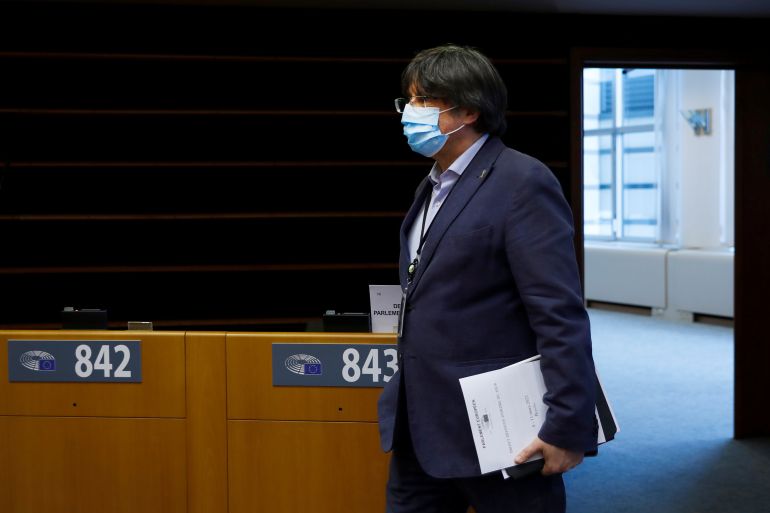EU Parliament lifts immunity of 3 Catalans, including Puigdemont
The move could see Spain restart efforts to have separatist leader extradited to face trial.

The European Parliament (EP) has voted to strip immunity from the former president of Spain’s Catalonia region, Carles Puigdemont, and two of his associates – a move that could pave the way for the political figures to be extradited.
The Brussels-based chamber on Tuesday announced that 400 legislators had voted a day earlier for Puigdemont’s immunity from prosecution to be waived, while 248 were against and 45 abstained.
Keep reading
list of 4 itemsCatalonia election: What do the results mean?
Spain’s Catalonia holds key election amid fears over COVID
Fresh uncertainty in Catalonia as court rules against leader
The votes to lift the immunity of his associates – former Catalan health minister Toni Comin and former regional education minister Clara Ponsati – were by largely similar margins.
“We have lost our immunity, but the European Parliament has lost more than that. And as a result, European democracy, too,” Puigdemont said afterward. “This is a clear case of political persecution.”
Puigdemont and Comin, who are in self-imposed exile in Belgium, formally became members of the EP in June 2019, while Ponsati, who is in Scotland, was officially a member from January 2020.
All are subject to European arrest warrants issued by Spain, which is seeking their extradition related to their role in organising a 2017 independence referendum.
The referendum saw a large majority vote for Catalonia’s secession from Spain, but the central government in Madrid had declared the vote illegal and unconstitutional.
Hundreds of people were injured in a police crackdown on the day of the poll.
Belgium has so far denied Spain’s requests.
A court in January refused to extradite Lluis Puig, another former member of the Catalan government living in Belgium, over charges of misuse of public funds.
Various independence leaders were convicted in Spain of the same charge of sedition in 2019 and sentenced to up to 13 years in prison.
Before Monday’s vote, the EP said the alleged acts and prosecution pre-dated Puigdemont, Comin and Ponsati becoming MEPs.
It also said it was for national judicial systems of EU countries to determine criminal proceedings.
The EP’s legal affairs committee voted last month that immunity from prosecution should be waived. In each case, the vote was 15 in favour, eight against and two abstentions
Puigdemont’s legal team is planning to appeal losing his immunity to the European Court of Justice in Luxembourg.
Spain’s foreign minister on Tuesday hailed the European Parliament’s decision, saying it showed the Catalonia issue was to be resolved within Spain.
“With this decision, they’re sending out a triple message, firstly: an MEP cannot use their status to protect themselves from appearing in court for possible breaches of national law and a second message about the rule of law and respect for the Spanish justice system,” Foreign Minister Arancha Gonzalez Laya told reporters.
“The third message is that the Catalonia problem must be resolved within Spain and not at a European level,” she added, saying Madrid was extending a hand to the political forces within the region to “seek a solution (to the independence crisis) through dialogue and negotiation”.
Mar Aguilera Vaques, a professor of constitutional law at Barcelona University, in Catalonia, said the European Parliament’s vote would be seen as “a win for Madrid” as it continues to grapple with the “elephant in the room” – the Catalan independence movement.
“But at the end of the day, this doesn’t mean much, as ultimately it will be a Belgian judge who decides whether Puigdemont will be extradited or not,” Vaques told Al Jazeera.